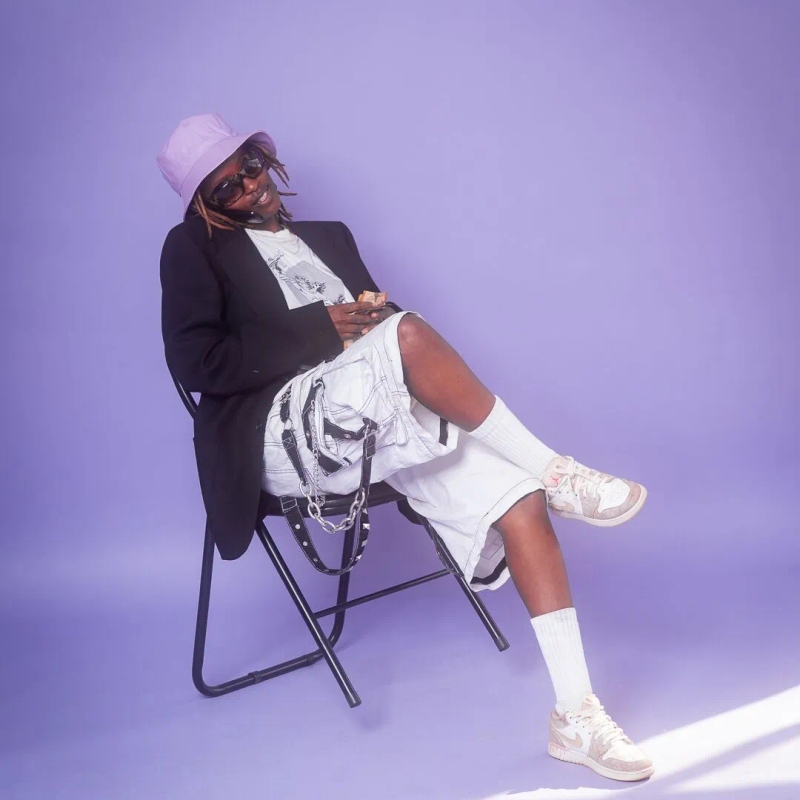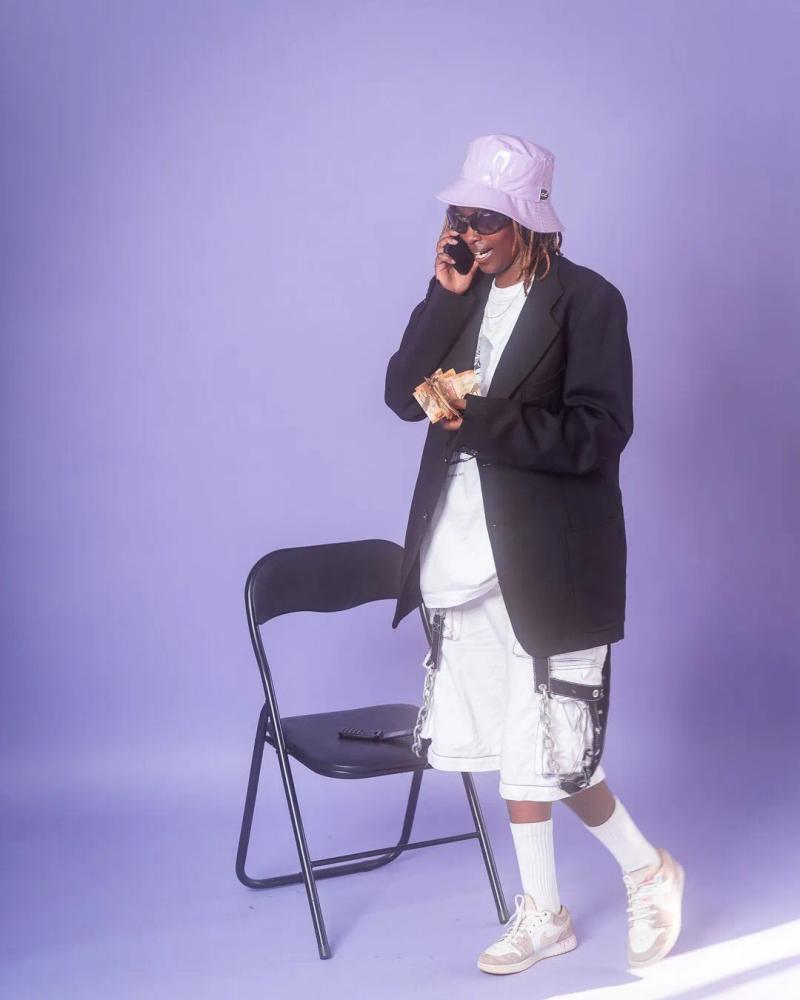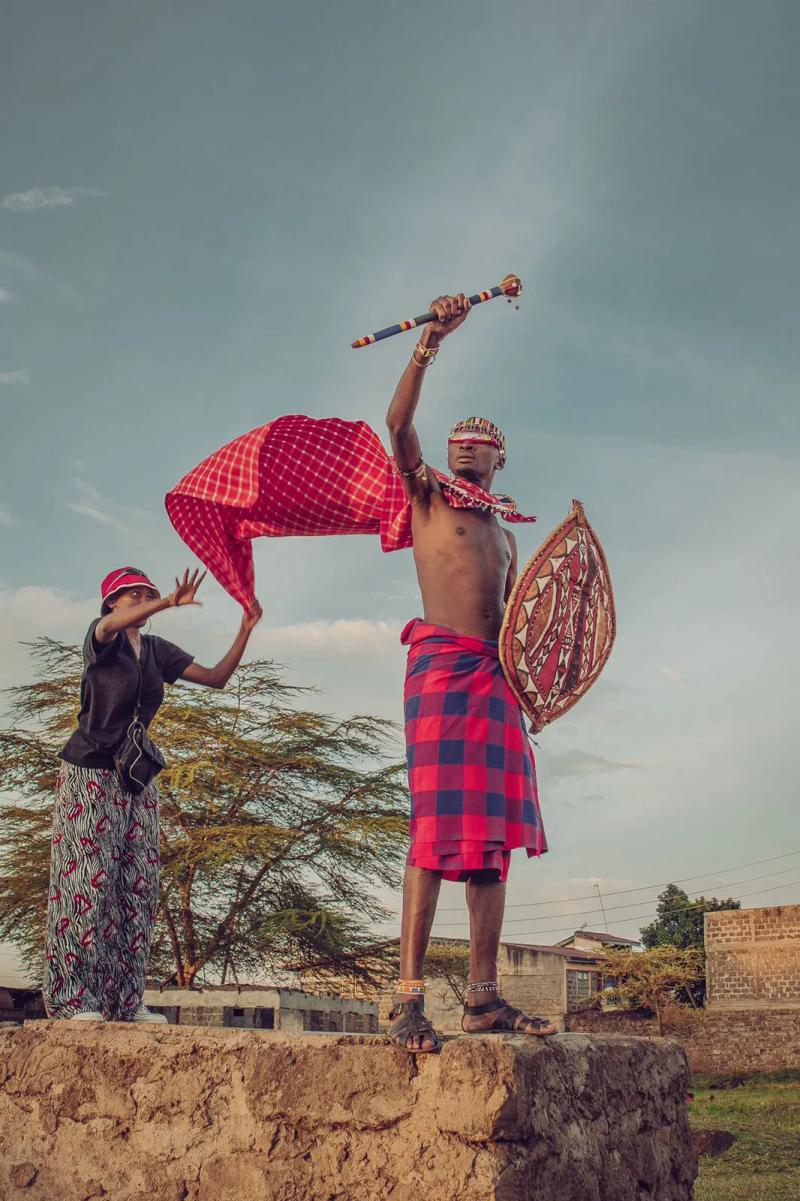in-conversation
In Conversation with Luca Rindii
by Carl Omolo
February 22, 2024

in-conversation
February 22, 2024

Luca Rindii is one of the most influential names in the Kenyan art, style, and entertainment scene. She’s an entrepreneur. In addition to having her own store, she has taken time to gaining expertise in various fields, moonlighting as a film and music video producer, fashion stylist, event curator and even as a model herself. She is the mastermind behind works and ad campaigns that have received international acclaim leading to partnerships with global brands like Guinness, Nike, Ballantines and NCBA Bank as well as key personalities on the national stage including Carrie Wahu, Bensoul, Chris Kaiga and Boutross.
I had the opportunity to visit her store and talk before she took me on a thrift run into Gikomba, a service she also provides.
Photo Credits: photoman254
My first question: One of your main initiatives that appears on your page a lot is ‘Sustainably Digitizing Gikomba.’ If you were to go back in time and explain that to your 14-year-old self, how would you say it?
Imma just tell her that it means I want to make Gikomba more clean and less hectic and more accessible for everyone.
It’s been said that the secret to not only making money, but carving a space for yourself, is to find a way to solve people’s problems. What do you think are the problems you help people solve?
First of all, drip. I help people put outfits together. Um, I’m also very good at like, making your ideas tangible, whatever your vision is. I can make your Pinterest board come alive. Right now, I’m trying to teach people in Gikomba how to sell to bigger markets which are outside through your phone. So that’s, ideally the problem I solve for them cause not everyone comes or can come to Gikomba or can access Gikomba. And then also I want to make it clean, so technically I’m trying to make our world here greener and better and make it just all work you know?

So, so good. You’re actually about to take me into the belly of the beast and so what are the things I should expect and keep in mind as we go there?
People are going to harass you and be on your neck and over-charge you for stuff, so you should anticipate that, but like that’s what I’m here to protect you from cause I know these guys and all the tricks they use, so I’m going to be fighting for you price-wise.
But also, at the same time, it’s gonna be fun. Because you’re going to find so many pieces and some you might not be ready to buy right now and you’ll have to part with them but you’ll remember that specific thing, and you’ll think about it often.
Okay, okay. That’s very exciting. Ni vizuri nimekuja ready. (I was not ready)
What was your point of no return? What was that one project where you felt, “Okay, yeah, this is my space and this where I’m going to lock in”
For me, I think it was the first project I ever got. Like the first first one. I didn’t even go on set because I was not familiar with what the creative scene was or what a stylist does, but I had clothes. So I just gave my stylist friends clothes to go do their thing. But when they came back, they were so excited, literally they were so geeked! Like, “I wanna do this every day, I wanna do this every day!” And I was so curious, I’m like, “Kwani what happened? What did you guys see on the other side?” It was this feeling of curiosity as well as gratefulness. I was so happy that someone had taken my pieces and then they went to a space where they felt powerful and then they also came down here and said, “You need to keep doing this” “We want more of this.” And at that point I was just like, Yeah, I don’t care if the shop goes down, I have to keep doing this.
Excellent. Now, you do a lot of things, but one of them is being a producer. Which I find very cool because I’m always seeing their names first in the end credits after a movie ends. So, what’s your favourite part about being a producer?
I think the best part is just seeing the whole project come together on set cause being a producer means you have to talk to every single person on set. Like literally every model, every make up artist, every set designer, every — you have to talk to everyone and align and make sure we’re all on the same wavelength, you know?
So when you see that on set everyone is so comfortable and everything came together and they have everything they need and if they’re nervous, they come to you direct, it’s so fun. Like oh my gosh, I did it! Yay, you guys feel safe and we got shit done.
Aww, wow! I’ve actually had the pleasure of being a model on one of your sets and there are so many people working behind the scenes. What’s your process for knowing and choosing who to work with?
Okay, for now, how I work is according to what the project is and what it needs. I have to look at what my director prefers and — I literally just listen to my director and what they want. But at the same time vibes, vibes, vibes. You might have the best work, but if you’re looking like you’re going to be difficult to work with, I might not take that project. Cause with creatives, you work from your heart and that requires care. I think I’m a very accommodative person, so if I’m having a hard time with you, I just know people on set aren’t going to be very comfortable with that atmosphere.
And with creative work, you need to be in a space where I can talk to you and I can open up to you, you know? So for me, my process is first, your work. Your work has to be quality. That’s really how I shortlist anyone, just their work. And then second is just the energy or vibes: how people are receiving or responding to them.
That’s a really good policy, art is often a labour of love so as in like —
Yeah, exactly! You really have to intentionally pick who you work with. I have to know about the personality the person has. Because even if your work is the bomb.com, it can’t work if it looks like you’re going to have static with everyone on set. It’s not gonna give, it’s gonna ruin everyone’s edge and their whole vibe. It’s going to be fucked just because you want to be difficult to work with and me I can’t.
Kama haiezi work, haiezi work; that’s true. Um, on other news, you’ve spoken about your political aspirations before, is there anyone currently in the field that you would model yourself after or should we just get rid of everyone?
(laughs)
Right now in Kenya, I really do not think there is anyone I’m looking at and I’m like “yeah, I’m tryna be like you big dog” but I noticed the president of Burkina Faso, Traore. I think he’s the youngest head of State in Africa, probably the world. So that’s encouraging to me first of all.
Secondly, what inspires me about him is that he came and just turned his country around. He overthrew the government and got in that position and he’s making shit happen. I think he’s the one person I look at and first of all, I don’t need to be whatever the fuck age they require, if you’re really about change, it’s change, you know? He didn’t have to attain whatever age requirement they wanted or whatever.
I also like how bold he is, with everything he says. And he’s just so African centred. Like in Burkina Faso, their national language was French and he changed it back to their language. He was just like “nah, we’re going to do it our way. We’re not French, so why are we speaking this language of theirs?” And it might seem like a small change, but for me, that’s someone who’s looking at an African perspective, from an African perspective, for an African perspective. We have so much voice, we have so much to say, but the people we’ve put there to represent us, are the ones who are playing us. So to just see one leader, that is just like him feels pretty good.
And even before him, there was another one called Sankara.
Yeah! Thomas Sankara.
Yeah, exactly. And I just like the way they are cause it just shows you it’s not impossible to be a hard head and decide that this is what I stand for and this is how I run things.
You’ve stated clearly your intentions to be here in Kenya, to make money here in Kenya and to make here grow and work for you. We are all too familiar with the challenges in Kenya, tell me a little about what has captured your heart about here. Why is Kenya the place for you?
For me, it’s mostly cause me I like enjoying life. Literally I don’t wanna work so hard and I’m not having fun. And you can ask anyone in the world who’s travelled, Kenya is one of the coolest spaces to be in. The people are so active and outgoing. To me, it’s like New York in Africa or something. So for me, it’s just like I wanna stay here because I can have the most fun and be in the best places because Kenya is so beautiful. That’s one thing I’ve learnt really, everywhere looks the same, yes, there’s some differences here and there, it’s all the same to me; I don’t think you can find a beautiful sunset that you cannot find in a place like Kilifi.
So for me, it just came down to — like yeah, I wanna travel and see the world, but I wanna stay home because there’s a reason why I was raised here, and here is where I came to be and I trust the powers that be. So I really just want to stay home because even if I travel, New York is just Nairobi to me. Everywhere is the same, it’s the people that matter. And I just love Kenyans so much. I’ve interacted with many people from other countries in my work and I have enjoyed it but my people are just always going to be Kenyans. I just wanna stay here; I don’t feel like I need to go set up a life somewhere else and start up my generation somewhere else, this is good enough for me. Yeah.

Love it, love it, love it.
So tell me, what’s next for Big Luca? What should we look out for in 2024?
For now, I would say that the biggest thing is to show people what ‘Sustainably Digitizing Gikomba’ is. Tangibly show them what it is I’m trying to do, so I’ll try and explain; So like you see the way outside my store, it’s not as messy as the whole of Gikomba is, so it’s very manageable, so I want to do a project where we’d have a day or two to get people to come clean, that is outside help, the people who are here, the people online and the Luca team itself. We can just come and okota all the rubbish that’s here, we record it and then now we put it out as this is what digitizing Gikomba is about. It’s basically cleaning up this place. And we’re not waiting for the government to come do that, it’s personal responsibility. Like I want you to pick up your trash — that’s actually something I came to notice, our generation is very concious about littering. We don’t throw trash around, you know? You literally don’t just do that, someone would rather put so much trash in their bag that akifika kwa nyumba you’re just first of all dumping stuff in the bin. So, if us guys and if the younger generation can learn and internalize that, then we can just teach our elders that they really don’t need to be littering. Because hii takataka yote, it’s just someone who threw it away. They just don’t have that personal responsibility to the environment. So, it’s just like first of all educating them on that, and the best way to educate someone is by example. Just setting out a day, we come, we clean up this space and then now we just want to keep it this clean. If you see someone littering, it’s your job to tell them to pick it up.
Beautiful.
So, I want to put that as a concept, as an editorial concept, present it to a brand or my general online audience and just see the feedback and how it grows from there.
Alright, lovely! Imagine we’re done, that was basically it.
(laughs)
Love it, those were nice questions. Literally this is the one interview I’ve gotten that’s not like other interviews, every other interview is just rehearsed questions so this was very engaging. Like I’m tired of answering the same questions of like, “So what inspired Luca?” and all that.
(laughs)
Oh wow, thank you! At WhoWhatWhere, we do things a little differently, you know?